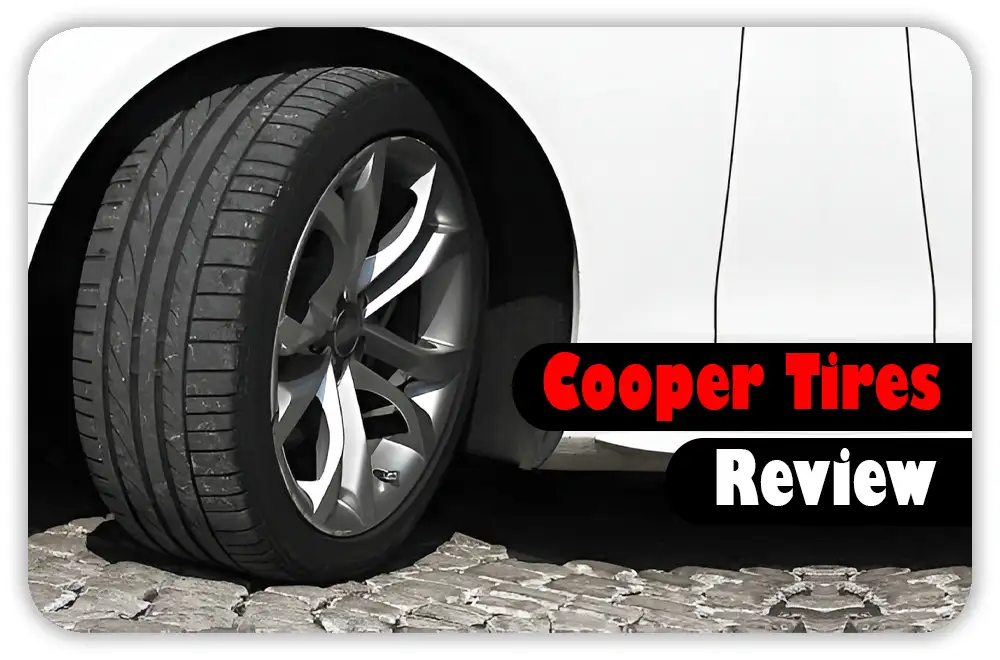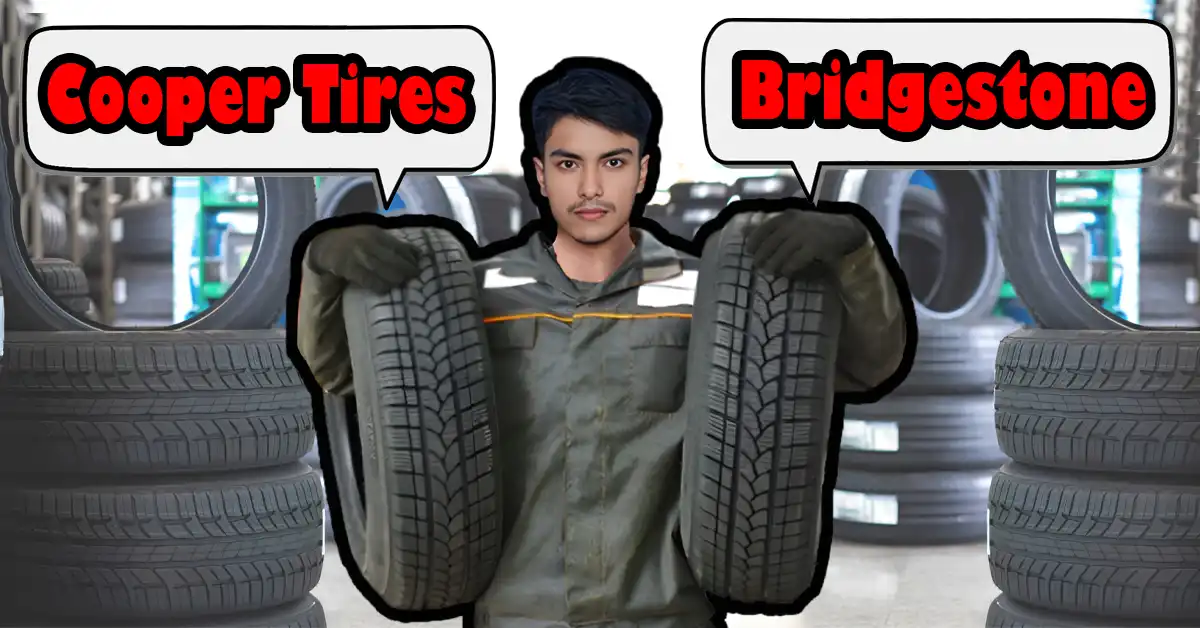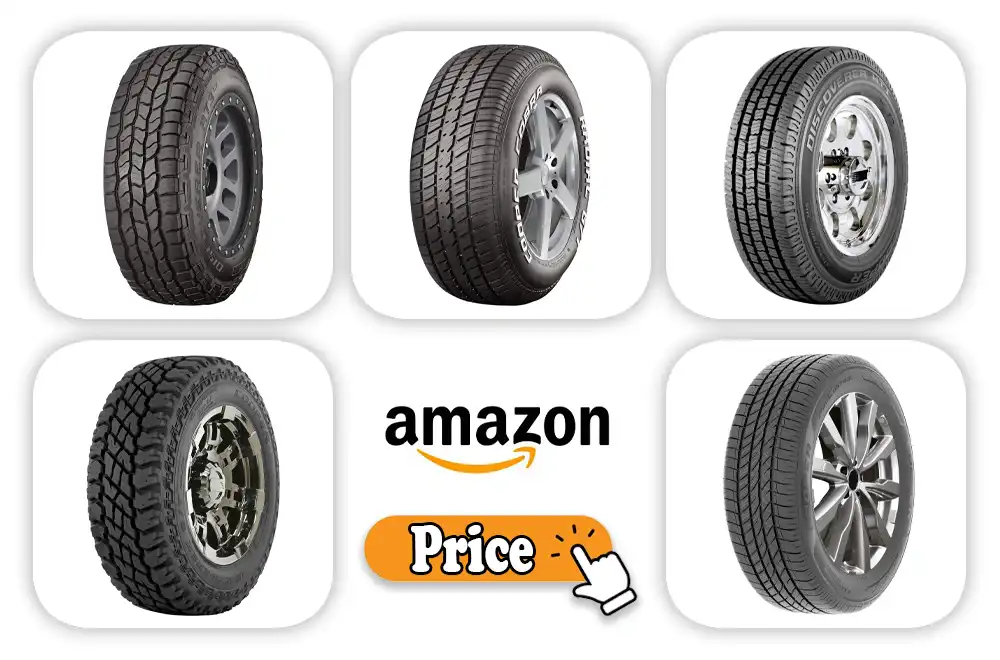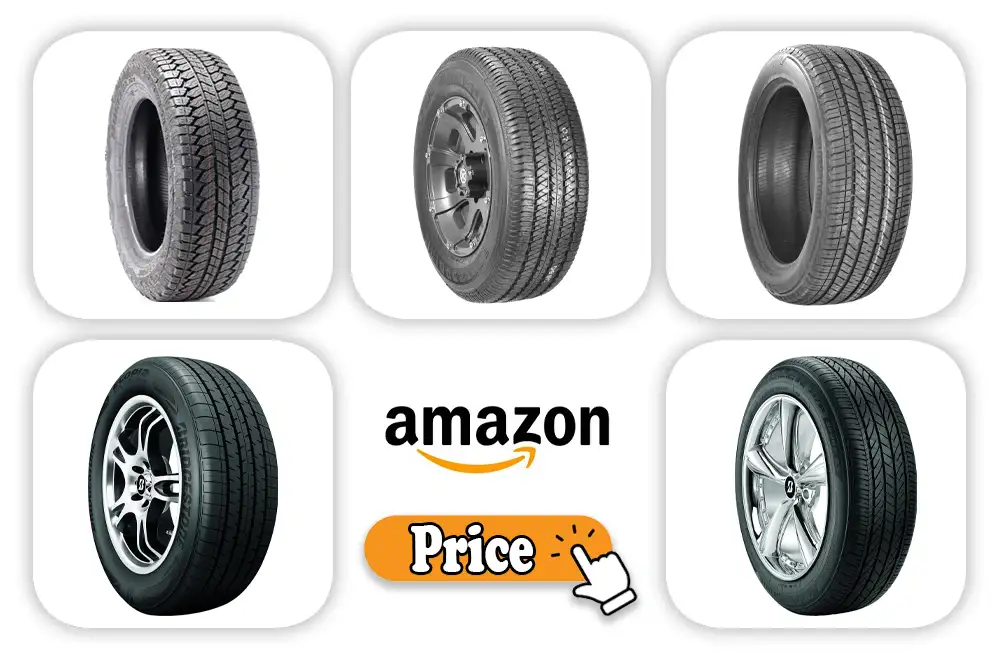The right tires can change how your car feels, handles, and saves fuel. I’ve driven on busy city streets, long highways, and tricky back roads. I’ve learned that tire choice matters.
Whether you drive a Ford, Chevrolet, or Toyota, the right tires boost safety, comfort, and control. In this Cooper vs. Bridgestone tire comparison, I’ll break down the key differences to help you decide.

Cooper Endeavor Plus All-Season 245/50R20 102V Tire
Check Price
Cooper Endeavor Plus All-Season 205/70R16 97H Tire
Check Price
Bridgestone Turanza EL440 Touring Tire 235/40R19 92 V
Check Price
Bridgestone Turanza EL440 Touring Tire 235/45R18 94 V
Check PriceTable of Contents
Cooper Tires Review

Cooper Cobra Radial G/T All-Season P235/60R15 98T Tire
Check Price
Cooper Discoverer S/T Maxx All-Season LT235/80R17 120/117Q Tire
Check PriceAfter driving with Cooper tires for years, I can say they perform well in all conditions. Whether on icy roads in Minnesota, sunny highways in Texas, or city traffic in Los Angeles, they hold up great.
Real-World Performance: My Cooper Tire Experience
Cold Weather & Snow: I’ve used Cooper Discoverer tires in Midwest snowstorms, and they gripped well. Some tires slide on ice, but these felt stable. I had fewer slips when braking, which gave me peace of mind.
Long-Distance & Highway Driving: On a trip from Chicago to Denver, my Coopers gave me a smooth, quiet ride. Even at high speeds, road noise was low. My fuel efficiency stayed steady, and bumps felt less harsh than with past tires.
Stop-and-Go Traffic & City Driving: In heavy traffic, these tires gripped the pavement well. Quick stops felt safe, and turning on wet roads was smooth. Compared to my old tires, I had fewer skids in the rain.

Key Features
- Hot Weather Durability: During a summer trip through Texas, my Cooper tires held up in extreme heat. The rubber stayed firm, and the tread gave good grip on hot roads.
- Tread & Grip: Cooper tires have deep grooves to push water away, helping to prevent hydroplaning. This made a big difference on wet roads.
- Tread Life: After 40,000 miles, my Coopers still had solid tread. While no tire lasts forever, these have been reliable.
- Comfort & Noise: The ride was smooth, and I heard little road noise, even on rough highways.
- Weather Ratings: Many Cooper tires have an M+S (mud and snow) rating. Some even have the 3PMSF (Three-Peak Mountain Snowflake) symbol for better winter traction.
What I Like
- Great grip – Handles well in rain, snow, and dry roads.
- Long tread life – I’ve driven over 50,000 miles before seeing major wear.
- Smooth ride – No excess vibration or noise.
- Good fuel efficiency – I noticed better gas mileage after switching.
- Reliable for everyday use – A great all-season tire.
What Could Be Better
- Not the cheapest – Good value, but not the lowest price.
- Not for extreme winter – Dedicated snow tires may work better.
- Can be hard to find – Some stores may not carry them.
- Mild road noise on rough roads – Usually quiet, but some models hum on coarse pavement.
Should You Buy Cooper Tires?
If you want a reliable, all-season tire with great traction and durability, Cooper is a great choice. They’re ideal for daily drivers and road trips.
If you drive in harsh winter conditions often, you may need snow tires. If price is your main concern, cheaper options exist, but Cooper’s durability makes them worth it.
Bridgestone Tires Review

Bridgestone Dueler H/L 400 Highway Terrain SUV Tire 265/50R20 107 T
Check Price
Bridgestone Dueler H/L Alenza Highway Terrain SUV Tire P275/55R20 111 H
Check PriceBridgestone tires are durable, reliable, and comfortable. I’ve driven for over 8 years across the U.S. and tested many brands. Whether on snowy Midwest roads or scorching Texas highways, Bridgestone tires stand out. Here’s what I’ve learned.
Real-World Performance: My Experience with Bridgestone Tires
Cold Weather & Snow: Minnesota winters are tough. But Bridgestone Blizzak tires handled icy roads well. They gripped the pavement, reducing slips when braking or turning. I felt much safer than with my old tires.
Long-Distance & Highway Driving: On a cross-country trip, my Bridgestone Turanza tires provided a smooth ride. Even at 70 mph, road noise was low. I also noticed a small boost in fuel efficiency.
Stop-and-Go Traffic & Urban Driving: In downtown Chicago, Bridgestone Potenza tires stood out. They gripped well during quick stops and sharp turns. I felt in control, even on wet roads.
Key Features
- Tread Pattern & Grip: Deep grooves and siping improve traction on wet and icy roads. The Blizzak series is excellent in snow.
- Tread Life: My Bridgestone Ecopia tires lasted over 50,000 miles before wearing down.
- Comfort & Noise Level: The Turanza series offers one of the quietest rides I’ve experienced.
- Weather Ratings: Many models have M+S (Mud and Snow) or 3PMSF (Three-Peak Mountain Snowflake) ratings for winter traction.
What I Like
- Strong Traction & Handling – Great on wet, snowy, and dry roads.
- Long Tread Life – My Turanza tires lasted over 50,000 miles.
- Comfortable Ride – Smooth and quiet, even at high speeds.
- Fuel Efficiency – Ecopia models improved my MPG.
- Good for Many Drivers – Works well for commuters and road-trippers.

What Could Be Better
- Higher Price – More expensive than budget brands, but worth it.
- Not for Extreme Winters – Blizzak tires are great, but dedicated winter tires work better in severe cold.
- Limited Availability – Some models, like Potenza or Ecopia, can be hard to find.
Final Thoughts
If you want a smooth ride, long tread life, and solid traction, Bridgestone is a great choice. These tires are ideal for highway drivers, commuters, and those facing mild to moderate winters.
However, if you drive in extreme snow, consider dedicated winter tires. Budget-conscious buyers may find cheaper options, but they may not last as long.
For everyday drivers looking for reliability and comfort, Bridgestone tires deliver.
Cooper Tires vs Bridgestone Tires: Detailed Comparison
Choosing the right tires can boost safety and comfort. Below, I compare Cooper and Bridgestone tires based on key factors to help you decide.
Tread Design & Grip: Cooper Tires vs Bridgestone Tires
Cooper tires work well on dry roads. Bridgestone tires stand out in wet weather. Both offer solid grip in winter.
| Aspect | Cooper | Bridgestone |
| Dry Traction | Strong grip | Reliable hold |
| Wet Performance | Good water control | Top-notch traction |
| Snow/Ice Grip | Solid winter grip | Excellent ice hold |
| Off-Road Handling | Strong tread | Decent stability |
Rating: Cooper: 8/10 | Bridgestone: 9/10
Durability & Tread Life: Cooper Tires vs Bridgestone Tires
Cooper tires offer solid mileage. Bridgestone tires often last longer in tough conditions.
| Factor | Cooper | Bridgestone |
| Mileage Warranty | Up to 70,000 miles | Up to 80,000 miles |
| Treadwear Longevity | Good wear pattern | Excellent durability |
| Sidewall Strength | Solid build | Tough design |
| All-Season Performance | Reliable in all weather | Smooth year-round |
Rating: Cooper: 8/10 | Bridgestone: 9/10
Comfort & Noise Levels: Cooper Tires vs Bridgestone Tires
Both brands give a smooth ride, but Cooper tires cut road noise better.
| Comfort Factor | Cooper | Bridgestone |
| Road Noise | Quiet drive | Moderate noise |
| Ride Comfort | Smooth feel | Comfortable ride |
| City Driving | Soft on potholes | Stable control |
| Highway Stability | Balanced handling | Reliable at high speeds |
Rating: Cooper: 9/10 | Bridgestone: 8/10
Fuel Efficiency Impact: Cooper Tires vs Bridgestone Tires
Bridgestone tires save more fuel. Cooper tires offer decent efficiency.
| Factor | Cooper | Bridgestone |
| Rolling Resistance | Slightly higher | Lower resistance |
| MPG Improvement | Modest savings | Better fuel economy |
| Eco-Friendly Materials | Limited options | Sustainable choices |
Rating: Cooper: 7/10 | Bridgestone: 9/10
Temperature Performance: Cooper Tires vs Bridgestone Tires
Both brands handle heat and cold well. Bridgestone tires perform better in extreme weather.
| Condition | Cooper | Bridgestone |
| Cold Weather | Good winter grip | Strong ice hold |
| Hot Weather | Resists heat well | Outstanding durability |
| Seasonal Versatility | Performs year-round | Strong in all weather |
Rating: Cooper: 8/10 | Bridgestone: 9/10
Longevity & Maintenance: Cooper Tires vs Bridgestone Tires
Both brands need regular rotation. Bridgestone tires tend to last longer with fewer issues.
| Longevity Factor | Cooper | Bridgestone |
| Lifespan Expectancy | 5-6 years | 6-8 years |
| Rotation Frequency | Every 6,000 miles | Every 7,500 miles |
| Puncture Resistance | Durable build | Stronger resistance |
Rating: Cooper: 8/10 | Bridgestone: 9/10
Final Recommendation: Cooper Tires vs Bridgestone Tires
Who should buy Cooper tires?
- Drivers seeking a quiet ride with great comfort.
- Budget-conscious buyers who want solid performance.
Who should buy Bridgestone tires?
- Drivers in wet or icy regions who need top traction.
- Those looking for tires that last longer and save fuel.
Who should consider other options?
- Off-road drivers who need aggressive tread designs.
- Drivers seeking the most eco-friendly materials.
Both brands have strengths. Choose the one that fits your driving needs best.
FAQs: Cooper Tires vs Bridgestone Tires
Are Cooper tires better than Bridgestone tires for winter driving?
Bridgestone tires grip ice and snow better, while Cooper tires handle well but may not match that level of traction.
Which tires last longer, Cooper or Bridgestone?
Bridgestone tires tend to last longer due to strong tread designs and tough rubber.
Are Cooper tires more affordable than Bridgestone tires?
Yes, Cooper tires cost less and are a great choice for budget-conscious drivers.
Which brand offers better highway performance?
Bridgestone tires provide a smoother ride and more stability at high speeds.
Are Cooper tires good for off-road driving?
Yes, Cooper tires perform well off-road with deep tread patterns for tough terrain.




